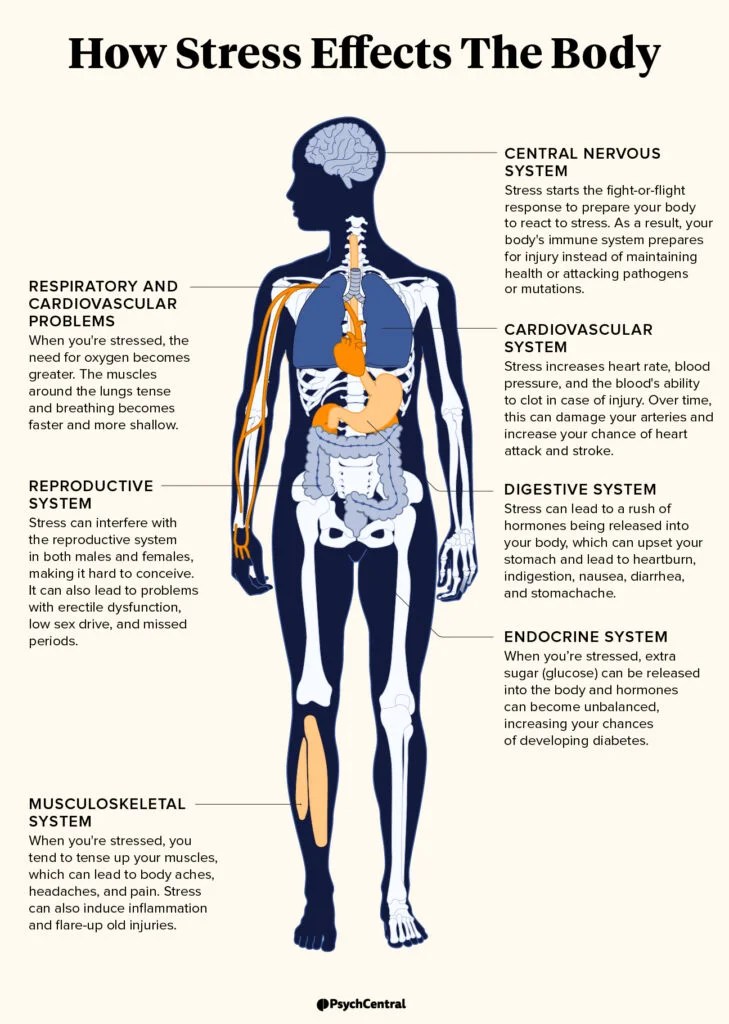Welcome to a fascinating exploration of the long-term effects of chronic stress on sleep health. We all experience stress from time to time, but when it becomes a constant presence in our lives, it can wreak havoc on our sleep patterns. In this article, we will delve into the intricate relationship between chronic stress and sleep, uncovering the ways in which stress can disrupt our precious slumber.
Sleep, oh glorious sleep, how we cherish thee! But unfortunately, chronic stress can be a formidable foe to our beloved rest. When stress becomes a regular companion, it can interfere with our ability to fall asleep, stay asleep, and even achieve the deep, restorative sleep our bodies and minds crave. It’s like having an unwelcome guest in our sleep sanctuary, tossing and turning, keeping us awake into the wee hours of the night.
So, what exactly happens when chronic stress takes a toll on our sleep health? Well, buckle up and get ready for a wild ride through the intricate pathways of our body and mind. From hormonal imbalances to racing thoughts and heightened anxiety, the effects of chronic stress on sleep can be profound and far-reaching. But fear not, dear reader, for we shall also explore strategies and techniques to reclaim our sleep from the clutches of stress. So, grab a cup of tea, get cozy, and let’s embark on this enlightening journey together!
Understanding the Long-Term Effects of Chronic Stress on Sleep Health
Chronic stress is a prevalent issue in today’s fast-paced world, affecting millions of individuals worldwide. It can stem from various sources such as work pressure, financial difficulties, relationship problems, or health concerns. While stress is a natural response to demanding situations, prolonged exposure to stress can have detrimental effects on our overall well-being, including our sleep health. In this article, we will explore the long-term effects of chronic stress on sleep and delve into strategies to mitigate its impact.
The Relationship Between Chronic Stress and Sleep
Chronic stress can significantly disrupt our sleep patterns, leading to various sleep disorders and impairing our overall sleep quality. When we experience stress, our bodies release stress hormones, such as cortisol, which are designed to help us cope with the situation. However, when stress becomes chronic, the continuous release of these hormones can interfere with our sleep-wake cycle.
One of the primary ways chronic stress affects sleep is by causing insomnia. Insomnia refers to difficulty falling asleep, staying asleep, or experiencing non-restorative sleep. Individuals with chronic stress often find themselves lying awake at night, their minds racing with worries and anxieties. This persistent sleeplessness can further exacerbate stress levels, creating a vicious cycle that is challenging to break.
Chronic stress can also contribute to the development of other sleep disorders, such as sleep apnea and restless legs syndrome. These conditions can further disrupt sleep, leading to daytime fatigue, decreased cognitive function, and a compromised immune system.
Effects of Chronic Stress on Sleep Health
1. **Decreased Sleep Duration**: Chronic stress can lead to a reduction in total sleep time, causing individuals to experience shorter periods of restorative sleep. This can leave them feeling tired and sluggish throughout the day, impacting their overall productivity and quality of life.
2. **Fragmented Sleep**: Stress can disrupt the continuity of sleep, causing frequent awakenings throughout the night. Even if individuals manage to fall asleep initially, they may find themselves waking up multiple times, unable to maintain a deep and uninterrupted sleep.
3. **Impaired Sleep Quality**: Chronic stress can negatively affect the quality of sleep, leading to lighter, less restorative sleep. Even if individuals manage to sleep for an adequate duration, they may wake up feeling unrefreshed and groggy.
4. **Increased Risk of Insomnia**: The persistent activation of the stress response can increase the likelihood of developing insomnia. Insomnia not only affects sleep but also impacts mental health, cognitive function, and overall well-being.
5. **Emotional Disturbances**: Chronic stress can contribute to the development of mood disorders, such as anxiety and depression, which can further disrupt sleep. The emotional burden of stress can lead to racing thoughts, increased worry, and difficulty relaxing, making it challenging to achieve restful sleep.
6. **Weakened Immune System**: Prolonged exposure to stress hormones can suppress the immune system, making individuals more susceptible to infections and illnesses. Sleep plays a crucial role in immune function, so when sleep is compromised, our ability to fight off pathogens is compromised as well.
7. **Cognitive Impairment**: Lack of quality sleep due to chronic stress can impair cognitive function, affecting memory, concentration, and decision-making abilities. This can have significant consequences in both personal and professional spheres.
8. **Increased Risk of Chronic Health Conditions**: Chronic stress has been linked to an increased risk of developing various chronic health conditions, including cardiovascular diseases, diabetes, and obesity. The negative impact on sleep health can contribute to these risks, as sleep deprivation has been associated with an increased likelihood of developing these conditions.
Understanding the long-term effects of chronic stress on sleep health is crucial in developing strategies to mitigate its impact. By prioritizing stress management techniques and adopting healthy sleep habits, individuals can promote better sleep and overall well-being. In the following sections, we will explore effective strategies to minimize the effects of chronic stress on sleep and improve sleep quality.
Key Takeaways – What are the long-term effects of chronic stress on sleep health?
- Chronic stress can disrupt sleep patterns and lead to insomnia.
- Long-term stress can contribute to the development of sleep disorders.
- Stress can cause increased arousal and difficulty falling asleep.
- Poor sleep quality due to stress can negatively impact overall health and well-being.
- Managing stress through relaxation techniques and a healthy lifestyle can improve sleep health.
Frequently Asked Questions
What is the impact of chronic stress on sleep quality?
Chronic stress can have a significant impact on sleep quality. When we experience stress on a regular basis, our bodies remain in a heightened state of alertness, making it difficult to relax and fall asleep. This can lead to difficulties falling asleep, frequent awakenings throughout the night, and overall poor sleep quality.
Additionally, chronic stress can disrupt the balance of hormones in the body, such as cortisol, which plays a role in regulating sleep-wake cycles. Elevated levels of cortisol can interfere with the natural rhythm of sleep, further exacerbating sleep disturbances caused by stress.
Does chronic stress affect sleep duration?
Yes, chronic stress can affect sleep duration. When we are stressed, our minds tend to race with worry and anxiety, making it challenging to quiet the thoughts and fall asleep. As a result, individuals experiencing chronic stress may find themselves spending more time awake in bed, leading to a decrease in overall sleep duration.
Furthermore, the impact of chronic stress on sleep duration can also be attributed to the physical symptoms that accompany stress, such as muscle tension, headaches, and gastrointestinal issues. These discomforts can cause further disturbances during sleep, resulting in shorter sleep duration.
Can chronic stress lead to insomnia?
Yes, chronic stress can contribute to the development of insomnia. Insomnia is characterized by difficulties falling asleep, staying asleep, or experiencing non-restorative sleep. The persistent activation of the body’s stress response system can disrupt the natural sleep-wake cycle, leading to insomnia.
Moreover, the emotional and psychological effects of chronic stress, such as anxiety and depression, can also contribute to the development of insomnia. The constant worry and rumination associated with stress can make it challenging to calm the mind and achieve restful sleep.
What are the long-term consequences of chronic stress on sleep health?
The long-term consequences of chronic stress on sleep health can be detrimental. Prolonged sleep disturbances caused by chronic stress can increase the risk of developing various health conditions, including cardiovascular diseases, obesity, diabetes, and mental health disorders.
Furthermore, chronic sleep deprivation resulting from chronic stress can impair cognitive function, memory, and concentration. It can also weaken the immune system, making individuals more susceptible to infections and illnesses. Overall, the long-term effects of chronic stress on sleep health can have a profound impact on overall well-being and quality of life.
How can chronic stress and its effects on sleep be managed?
Managing chronic stress and its effects on sleep requires a holistic approach. Incorporating stress management techniques such as relaxation exercises, mindfulness meditation, and regular physical activity can help reduce stress levels and promote better sleep.
Establishing a consistent sleep routine, creating a sleep-friendly environment, and practicing good sleep hygiene habits can also support improved sleep quality. Additionally, seeking support from healthcare professionals, such as therapists or sleep specialists, can provide guidance and strategies for managing chronic stress and its impact on sleep health.
How Chronic Stress Harms Your Body
Final Summary: The Lingering Effects of Chronic Stress on Your Sleep Health
After diving deep into the topic of chronic stress and its impact on sleep health, it’s clear that the long-term effects are significant and can have a lasting impact on our overall well-being. Chronic stress disrupts the delicate balance of our body’s natural sleep-wake cycle, leading to a multitude of sleep-related issues. From insomnia to sleep fragmentation, the consequences of chronic stress on our sleep health are far-reaching.
One of the main takeaways from this exploration is the intricate relationship between stress and sleep. Chronic stress not only affects the quantity of our sleep but also the quality. It disrupts the production of important sleep hormones, such as melatonin, leading to difficulties falling asleep and staying asleep throughout the night. This can create a vicious cycle, as inadequate sleep further exacerbates stress levels, creating a detrimental feedback loop.
Furthermore, chronic stress can also contribute to the development of sleep disorders like sleep apnea and restless leg syndrome. These conditions not only disrupt our sleep but can also have serious implications for our overall health and well-being. It’s essential to address and manage chronic stress effectively to mitigate these long-term effects on sleep health.
In conclusion, chronic stress poses a significant threat to our sleep health. From the moment we lay down to rest, the impact of stress can be felt. From difficulties falling asleep to fragmented sleep patterns, the consequences of chronic stress on our sleep are undeniable. It’s crucial to prioritize stress management techniques and seek support when needed to break the cycle and restore a healthy sleep routine. By addressing chronic stress head-on, we can pave the way for better sleep and improved overall well-being.




